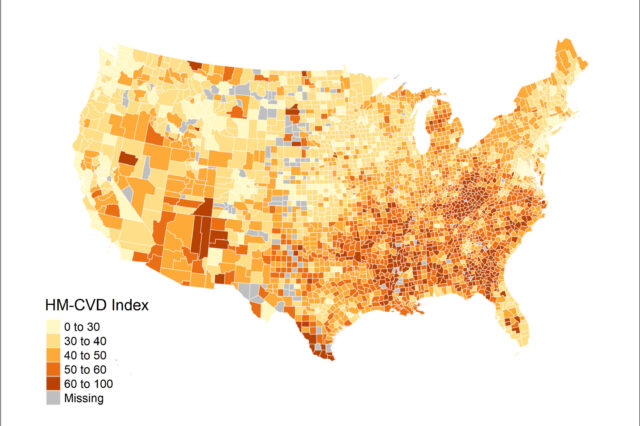UF researchers develop risk score to predict deaths from heart attacks, stroke in every U.S. county

The COVID-19 crisis has reinforced the fact that racial, income and social inequalities play an important role in health and disease. The same is true for heart health. Factors such as poverty, a shortage of health care providers and food deserts can all contribute to increased risk for heart disease, the leading cause of death in the U.S.
Researchers at the University of Florida have created a score based on these and other factors — known as social determinants of health — that can predict with a high level of accuracy the number of deaths from heart attacks or strokes in every county in the U.S. Understanding which counties are at high risk allows health planners to target interventions for their residents.
The risk score’s creators, Young-Rock Hong, Ph.D., M.P.H., and Arch Mainous III, Ph.D., both faculty members in the UF College of Public Health and Health Professions, describe the tool’s development and validation in a paper published this week in the Annals of Family Medicine.
“The risk score could be very useful to policymakers and public health leaders,” said Mainous, a professor in the department of health services research, management and policy. “As with all population health initiatives, the first step is to segment the population and determine where action is needed and importantly, what type of action. This measure identifies places that need help.”
The Hong-Mainous Cardiovascular Disease Index is based on seven social determinants of health: the percentage of minority residents, poverty rate, the percentage of the population without a high school diploma, the ratio of grocery stores and fast food restaurant to residents, the after-tax price of soda and the number of primary care physicians. They used data from half of the more than 3,000 U.S. counties to develop the risk score and validated it with data from the remaining counties. They found the tool did a better job at predicting deaths from heart disease than any current tools, which typically only use one social determinant of health, such as poverty.
The investigators have calculated a risk score for every U.S. county using 2015-2017 data. Visit https://bit.ly/392YYN3 and enter a state abbreviation and county name to view risk scores. The researchers will update the scores when new census data become available.
Hong and Mainous noted that consistent with previous studies, areas in the South bear a higher burden of disease.
“Many counties located in southern states, which are often characterized by higher obesity and diabetes prevalence, food deserts and health professional shortage areas, were identified at increased risk for cardiovascular disease,” said Hong, an assistant professor in the department of health services research, management and policy and a member of the UF Health Cancer Center.
Mainous and colleague Hend Mansoor, Ph.D., Pharm.D., have created the EZ-CVD, a simple, six-question risk score for individuals to determine their own health disease risk and share with their health care provider.
Next, the researchers plan to quantify the social determinants of health contributing to COVID-19 outcomes, such as infection, hospitalization and mortality. Previous research suggests that areas with high poverty, income inequality and higher numbers of minority residents are disproportionately impacted by the virus.
“We need a comprehensive understanding of the interconnected pathways of social determinants of health factors to COVID-19 in order to better inform our health system and improve COVID-19 preparedness and response,” Hong said.
About the author
